|
 Secure Site
Secure Site
|
 |
Archive for the 'Chime Alarm Clocks' Category
 Procrastinator Sleep Type: The Procrastinator
You get tired early in the evening, but by the time you go to bed, you’re wide awake.
What’s Going On?
Our bodies have two different mechanisms, one for sleep and one for wakefulness. Paul Glovinsky, Ph.D., coauthor of “The Insomnia Answer,” calls them the sleep drive and the alerting force, respectively. The problem is, these two forces can often be at odds with each other.
“The sleep drive depends on the fact that we’ve been up for a certain amount of hours, building the need for sleep,” he says. The longer we’re awake, the more intense it gets. But napping early in the evening or zoning out while watching TV can partially satisfy that sleep drive — so come bedtime, the alerting force has the upper hand, making it hard to nod off. For many people, adds Rubin Naiman, Ph.D., director of Sleep Programs at Miraval Resort, there’s “an ideal window of opportunity for falling asleep.”
What to Do
For starters, be aware of your sleep drive. If you feel yourself starting to doze off in the early evening — at dinner, for instance, or while reading or watching TV — get up and walk around. “It doesn’t take a lot. You don’t have to get up and run a mile,” explains Charles Atwood, Jr., M.D., associate director of the Sleep Medicine Center at the University of Pittsburgh Medical Center. “Just walk around your house a little bit. Usually that’s enough to keep you alert for another hour or so.”
However, if you feel yourself getting tired later in the night (say after 9 p.m. or so), don’t force your body to burn the midnight oil unless you really have to. As Bala Manyam, M.D., a neurologist and Ayurvedic expert, puts it, “Mother Nature is telling you, ‘You silly human being. You’re tired. Go to sleep now.'”
Waking up in the morning should be as pleasant as falling asleep at night. The Zen Alarm Clock’s gradual, gentle awakening is transformative.
“The Zen Alarm Clock,” uses soothing acoustic chimes that awaken users gently and gradually, making waking up a real pleasure. Rather than an artificial recorded sound played through a speaker, the Zen Clock features an alloy chime bar similar to a wind chime. When the clock’s alarm is triggered, its chime produces a long-resonating, beautiful acoustic tone reminiscent of a temple gong. Then, as the ring tone gradually fades away, the clock remains silent until it automatically strikes again three minutes later. The frequency of the chime strikes gradually increase over ten-minutes, eventually striking every five seconds, so they are guaranteed to wake up even the heaviest sleeper.
Adapted from Body + Soul Magazine, May 2008 by Sarah Schmelling
Boulder, Colorado—an innovative company has taken one of life’s most unpleasant experiences (being startled awake by your alarm clock early Monday morning), and transformed it into something to actually look forward to. “The Zen Alarm Clock,” uses soothing acoustic chimes that awaken users gently and gradually, making waking up a real pleasure. Rather than an artificial recorded sound played through a speaker, the Zen Clock features an alloy chime bar similar to a wind chime. When the clock’s alarm is triggered, its chime produces a long-resonating, beautiful acoustic tone reminiscent of a temple gong. Then, as the ring tone gradually fades away, the clock remains silent until it automatically strikes again three minutes later. The frequency of the chime strikes gradually increase over ten-minutes, eventually striking every five seconds, so they are guaranteed to wake up even the heaviest sleeper. This gentle, ten-minute “progressive awakening” leaves users feeling less groggy, and even helps with dream recall.
 Natural Awaking Clock with Chime Sounds Now & Zen’s Alarm Clock and Meditation Timer Store
1638 Pearl Street
Boulder, CO 80302
(800) 779-6383
Posted in Bamboo Chime Clocks, Chime Alarm Clocks, Natural Awakening, Now & Zen Alarm Clocks, sleep, Sleep Habits
 Flowering Plum and Moon, Koson Inspire your afternoon or evenings and refresh your senses by creating sacred space for a personal tea ceremony.
From the fragrant aromas to the delicate flavors to the simple comfort of a warm mug, tea is a meditation for the senses. It also creates space to unwind and reconnect.
Preparing it is a process, one that forces you to slow down and relax. “Tea is a gift from the earth,” says Diana Rosen, author of “Meditations With Tea,” “and enjoying it is a gift to yourself.”
By creating your own daily tea ritual in the afternoon when the day tends to drag, you can refresh your senses, refocus your thoughts, enjoy some peace, and — the best part — introduce a sacred moment into your day.
Prepare for Tea
In one traditional Japanese tea ceremony, guests are met at the gate by their host and led silently through a garden to the tea room, signifying a departure from the everyday world and an entrance into a spiritual realm.
You probably don’t have a dedicated tea room, but you too can create a space in your afternoon for disconnecting from the day’s stresses, whether you’re at the office or at home. Here’s our simple step-by-step approach to creating your own personal tea ceremony.
Dedicate a Space
This can mean moving to another room, a favorite chair, or just to the other side of your desk — or simply clearing a space for tea on your table or work space. You might consider using a place mat or a tray to visually set your tea space apart from everything else.
 Teapot and cup with green tea Set the Stage
A tea ceremony is about atmosphere. Light a candle or play music to set the mood. If you’re in a busy office, just close your eyes and listen to your breath for a few minutes to switch gears and set the tone. Set your Zen Alarm Clock so that you will hear a lovely chime at the end of your tea time.
Select Your Tea
Bring some intention to your choice. What are you in the mood for? A mild, grassy green? A refreshing peppermint? A rich, vibrant oolong or black tea? As Confucius said, “Let your palate be your guide.”
Use Your Favorite Accoutrements
The personal objects you use for tea making will help make this practice your own. Whether it’s a pretty mug, an iron teapot, or a favorite infuser, using something special for your tea ritual inspires a ceremonial feel. Set your Zen Alarm Clock & Timer to time your tea for 5 minutes for optimal taste.
exerpted from Body + Soul, September 2005
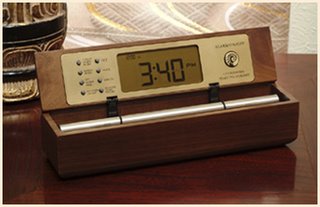 Digital Zen Timer, good for timing tea Now & Zen’s Chime
Timer Store
1638 Pearl Street
Boulder, CO 80302
(800) 779-6383
Posted in Chime Alarm Clocks, Japanese Inspired Zen Clocks, mindfulness practice, Now & Zen Alarm Clocks
 what do our dreams mean? Your nighttime revelries could hold the key to your health.
By Jeanne Ricci
It has happened to all of us: You sit up in bed after a doozy of a dream and wonder What did that mean? Mankind’s fascination with dreams has a long history. In fact, one of the world’s oldest surviving documents, an Egyptian papyrus, contains dream interpretations. Most ancient cultures believed dreams were communications from deities or departed souls. More recently, psychologists Sigmund Freud and Carl Jung paved the way for using dream analysis when treating patients, believing dreams could shed light on the workings of the unconscious mind. Today, many medical and psychiatric professionals believe dreaming can help us move beyond depression and grief and even identify underlying health issues.
As long as you are sleeping, you are dreaming. That’s right, everyone dreams—even if you don’t remember your nightly adventures. “Most dreams occur during REM (rapid eye movement) sleep, which replenishes certain neurotransmitters,” writes Deirdre Barrett, PhD, assistant professor of psychology at Harvard Medical School, in her book The Committee of Sleep (Crown, 2001). Since you enter the light sleep stage characterized by REM every 90 minutes, you’ll likely have four to five dreams a night, assuming you sleep for eight hours. “Interfering with REM, and thus dreaming, interferes with creativity, problem-solving capability, memory, and, in extreme situations, even immune function and body temperature,” says Barrett. You don’t have to remember your dreams to reap some of the benefits, but if you can recall them, your dreams could tell you a lot. (For tips to enhance dream recall, see “To Dream, Perchance to Remember” on page 73.) “But stay away from dream dictionaries that would have you believe that one symbol means one thing,” Barrett warns. Instead, she recommends Our Dreaming Mind by Robert L. Van de Castle (Ballantine Books, 1995), which focuses on dream theory and learning to work with your dreams. If you really dive deeply into your dream life, the payoff is multifold. You can tap into more clarity and creativity, feel less depressed and stressed, and maybe even be able to predict disease.
Tap into your dream tank
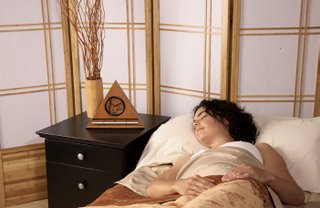 zen clocks help remind you of your dreams With a little effort, you can draw creative inspiration for both your professional and personal life from dreams. Need help solving a problem at work or making a decision for your household? Dreams can shed light on information stored in your brain and also help you think outside the box. “If you are stuck in your waking life on any sort of issue, then dreams can help you come to a resolution,” says Barrett. In fact, artists, writers, and philosophers such as René Descartes and Samuel Taylor Coleridge have used a method called dream incubation to nurture their creative processes.
To get started incubating dreams, write a question such as Which apartment should I rent? or How can I increase productivity at work? on a piece of paper and place it by your bed. Review the question before going to sleep and tell yourself you want to dream about it. Keep a pen and paper on the nightstand. For the next several nights, every time you wake up, lie quietly and try to recall your dreams. Write down anything you remember—events, places, characters, and feelings. The answer to your question may appear obvious after one night, or it could come to you over time as you piece together recurring ideas and themes. As with anything, the more you practice incubating and analyzing dreams, the more insight you’ll draw.
The blues are but a dream
 Hiroshige, The Moon Over a Warterfall An active dream life can help you shake the blues. Research conducted at Rush Presbyterian St. Luke’s Medical Center in Chicago found that people who were depressed after a divorce felt better more quickly if they had, and were able to recall, both good and bad dreams about their ex-spouses. Rosalind Cartwright, PhD, director of the research program, and her colleagues found that as dreams involving an ex-spouse became less negative and less frequent, their subjects’ depression lifted. This is not to say that people who don’t remember their dreams are more likely to be depressed—but people who do remember may recover more quickly from traumatic events such as divorce.
Similarly, people suffering from post-traumatic stress disorder (PTSD) are often encouraged to use dreams to aid their recovery. PTSD sufferers commonly have nightmares about real events that prolong their trauma. If they can successfully redirect a negative dream and change its outcome via hypnosis or self-suggestion at bedtime, it not only stops the nightmares but also lessens other symptoms, like heightened startle responses and daytime flashbacks, says Barrett. This method can also quash recurring nightmares for people who don’t have PTSD. Throughout the day and before bedtime, think of the dream and vividly imagine a more positive outcome. With determination, you can eventually change the content of your nightmare.
The interpreter of maladies
Is your body trying to tell you something? “Someone might dream she has cancer or some disease and then later see the first clinical sign of it,” says Barrett. The idea that our subconscious knows about illness before our conscious mind goes back to Hippocrates. Our body, it seems, often sends early warning signals that don’t always reach our consciousness. When we sleep and dream, the sensory overload that’s now part of everyday life gets blocked, making our psyches more receptive to messages our bodies send.
Shanee Stepakoff, a clinical psychologist in New York City, experienced this firsthand. “I had a mark on my cheek that looked like a freckle. I asked a few different dermatologists about it, and they all said it was nothing, but I kept having dreams about it,” she says. Stepakoff continued to see cancer metaphors in her dreams. “Finally, I had a very intense dream in which the word check kept appearing in various contexts (checkbook, write a check),” Stepakoff says. She believed this was her psyche urging her to get the spot on her cheek checked. Her doctor didn’t want to do a biopsy, but she insisted. Sure enough, it came back as melanoma—luckily, they caught it in time.
“I believe that the psyche gives us messages when there is something important that we need to pay attention to—it could be about our health, but it could also be about a relationship, a person in our lives, or a job situation,” says Stepakoff. “I think it is part of how our psyches help us survive and, ideally, to become more whole.”
Jeanne Ricci is a writer living in New York City.
To Dream, Perchance to Remember
It’s hard to learn from your dreams if you can’t remember them. But even if you draw a blank every morning, don’t fret. Follow these steps, recommended by Deirdre Barrett, PhD, assistant professor of psychology at Harvard Medical School, and Andrew Holecek, a dream workshop teacher at Colorado’s Shambhala Mountain Center, to enhance your dream recall.
* Get seven to eight hours of sleep a night. The more you sleep, the more dreams you will have, increasing the likelihood you’ll remember one of them.
* Throughout the day and right before you fall asleep, remind yourself of your intention to remember your dreams.
* Keep a pen and paper by your bed. A dream journal can encourage recall and, at the very least, help you document any fragment you do remember upon waking.
* When you first wake up, don’t move. Lie quietly and reflect on any image that comes to mind. Sometimes a whole dream scenario will come back to you.
* Be mindful during the day, not just about dreams but about everything going on around you. The lucidity you cultivate in waking life will translate to your dream life.
* Set an alarm to wake you every two hours throughout the night. When the alarm sounds, write down as much as you can remember about the dream you were just having.
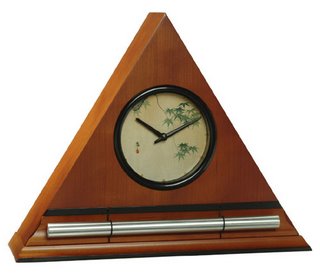 Zen Alarm Clocks for a Soothing Wake-up Now & Zen Headquarter Store
1638 Pearl Street
Boulder, CO 80302
(800) 779-6383
Posted in Chime Alarm Clocks, sleep, Sleep Habits
 winter self massage During winter, nature sighs deeply and burrows down for a long sleep. Like the denning bears and squirrels, use these cozy times to reduce stress. Especially in urban environments, we often become detached from this seasonal message. Continuing at a frenzied pace, we develop anxiety, high blood pressure, and digestive upset. To reduce stress, “in winter we focus a lot more on massage and nutrition,” says hydrotherapist Kristi Zimmer. Try this self-massage five minutes before bed and just after waking up in the morning: Set your Zen Chime Timer for 5 minutes. Lie on your back and make gentle circular motions around your belly with both hands, going clockwise as you breathe deeply. After five minutes of this, leave your hands on your stomach as you take 20 deep breaths, sending the breath to your organs. The deep breathing calms the body and mind, while the massage aids digestion.
adapted from Natural Solutions Magazine, January 2007 by Nora Isaacs
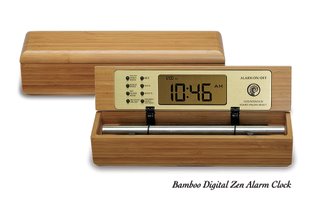 Chime Timers in Bamboo with Natural Acoustic Chimes Now & Zen’s Natural Chime Timer Store
1638 Pearl Street
Boulder, CO 80302
(800) 779-6383
Posted in Bamboo Chime Clocks, Chime Alarm Clocks, intention, Meditation Timers, Meditation Tools, mindfulness practice, Natural Awakening, Well-being, Zen Timers
 Floating Away... Ukiyo-e by Takeuchi Keishà Digital Zen Alarm Clock features
1) Alarm Function, features Now & Zen’s signature 10-minute wake up chime sequence—the perfect amount of time for your progressive awakening. The chime strikes gradually increase according to a golden ratio progression, which you can read about on pages 26-28 of the clock’s booklet, available on Now & Zen’s website.
(2) Countdown timer, perfect for meditation, counts backwards from any set time. It can be set from a minimum of 10 seconds to a maximum of 20 hours. When the timer reaches zero it strikes the chime once, and then begins its preprogrammed progression of chime strikes—striking again in 3 minutes, then in one minute—the same progression as the alarm sequence. We usually set ours for 20 minutes, but then linger in meditation for the first few chime strikes once the strike sequence begins.
(3) Interval timer, is perfect for yoga or other practices wherein a periodic reminder can help guide you through the practice. The interval timer uses the same function as the countdown timer except when it counts down to zero, it strikes only once and then begins counting down again from the pre-set time, continuously. We set the interval timer to strike every minute during yoga sessions to signal the time to change positions.
(4) Hour Chime, is a wonderful feature with many uses. The clock can be set to simply chime once on the hour every hour (muted automatically when the alarm is set, so you can sleep). We use this feature in our office to help the day go by, and when it rings on the hour it helps end meetings on time with a crisp “ding”.
 Digital Zen Alarm Clocks, available in maple, walnut, bamboo, and black lacquer
(5) The Chime’s tone, the Digital Zen Clock comes in either a 7 inch “B Tone” or a 9 inch “E Tone” chime. These long-resonating acoustic chimes have been hand tuned using the natural Pythagorean tuning method to produce the same frequencies as the tuning forks used by musical therapists. The chime strike force can be set to “Low” or “High” to create a tone optimal for you.
(6) Power and light, the clock runs on AC power (plug included) or on 2 AA batteries (not included). The LCD display is lighted. When in battery mode the light comes on by touching any button and goes off automatically in 10 seconds to save power. When the clock is plugged in it can be set so that the display light stays on permanently.
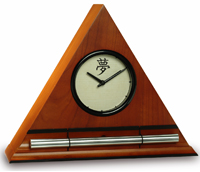 Chime Alarm Clock - Soft Sounds Alarm Clocks Now & Zen’s Acoustic Alarm Clock Shop
1638 Pearl Street
Boulder, CO 80302
(800) 779-6383
Posted in Chime Alarm Clocks, Golden Ratio, Japanese Inspired Zen Clocks, Meditation Timers, Meditation Tools, Natural Awakening, Now & Zen Alarm Clocks, Progressive Awakening, Yoga Timer, Yoga Timers by Now & Zen, Zen Timers
 Japanese Ukiyo-e Crane Print, unknown Now & Zen, Inc. – Boulder, CO – they integrate “real” Natural Sounds into The Zen Alarm Clocks
The natural foods industry is evolving to encompass the broader category of “natural products.” And The Zen Alarm Clock is perhaps the first truly “natural” electronic consumer product: it features an acoustic Tibetan bell-like chime producing natural sounds (as opposed to a sound produced by a speaker); it is housed in a natural hardwood case; and the gradually increasing 10 minute progression of the chime strikes simulates the process of waking up naturally. The Zen Alarm Clock thus appeals to the natural product consumer on many levels — even the aesthetic of its design was created with these people in mind.
 Bamboo Zen Alarm Clock, a natural consumer electronic product Now & Zen – The Gradual Alarm Clock Store
1638 Pearl Street
Boulder, CO 80302
Posted in Chime Alarm Clocks, Japanese Inspired Zen Clocks, Natural Awakening, Now & Zen Alarm Clocks, Progressive Awakening
 Use Mindfulness Practices to Stop Stress You’re cut off while driving. Your children erupt into a screaming fight. Or you’re five minutes away from an interview for the job of your dreams and your composure evaporates in a rush of anxiety. When life delivers adversity, stress is the common response. Your body kicks into action, preparing for a fight. The adrenal glands pump out adrenaline and noradrenaline — hormones that increase the heart rate, quicken breathing, raise blood pressure, and tense muscles. You’re ready to take on the perceived threat to your safety or well-being.
Of course, in reality we rarely run from foes or physically challenge them. As a result, we don’t burn off these powerful hormones, leaving them to “course through our bloodstream,” explains Dr. Herbert Benson, a pioneer in stress research at Harvard Medical School’s Mind/Body Medical Institute. In the short term, a pounding heart and sweaty palms can exacerbate the stressful emotions you’re already feeling. Left unchecked, this chemical mix sets you up for an array of physical and emotional problems, says Benson, including anxiety, depression, and intensified PMS and menopause symptoms.
The next time you are facing a stressful situation, stop yourself from spiraling out of control and bring yourself back to center.
Our Zen Timepiece’s acoustic 6-inch brass bowl-gong clock & timer is the world’s ultimate alarm clock, practice timer, and “mindfulness bell.”
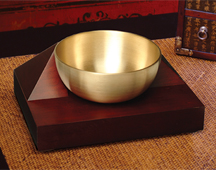 Acoustic Chime Timer and Alarm Clocks from Now & Zen - Boulder, CO
It fills your environment with beautifully complex tones whenever it strikes. In the morning, its exquisite sounds summon your consciousness into awakening with a series of subtle gongs that provide an elegant beginning to your day. Once you experience the Zen Timepiece’s progressive awakening, you’ll never want to wake up any other way. It also serves as the perfect meditation timer and ‘mindfulness practice clock’.
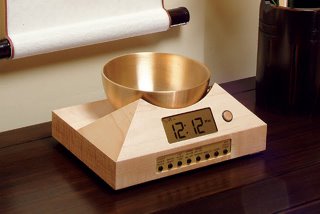 Mindfulness Practice Timer with Singing Bowl Adapted from Body + Soul, text by Erin O’Donnell
Now & Zen Meditation Timer Store
1638 Pearl Street
Boulder, CO 80302
(800) 779-6383
Posted in Bamboo Chime Clocks, Chime Alarm Clocks, intention, Japanese Inspired Zen Clocks, Meditation Tools, mindfulness practice, Now & Zen Alarm Clocks, Truth, Well-being
 yoga on the road Living in a temporary abode can present challenges for your yoga practice. Yet, this is the time you most need it.
By Sandy Anderson
Whether you’re staying in a hotel, a beachfront condo, or the spare bedroom of your parents’ house for the holidays, living in a temporary abode can present challenges for your yoga practice. Yet, this is the time you most need it—amidst the disrupted schedules, dietary changes, and the toll that traveling can take on your body and mind. So don’t give up!
Start by designating a physical place for your practice. As soon as you set your suitcase down, survey your lodgings and choose a clean, secluded place away from traffic patterns in the room. It might be between a couch and a chair, near a corner next to a nightstand, or next to a wall with a window. Next, set up the accoutrements of your practice: a yoga mat, mala beads, journal, or a folded blanket and pillow from the bed to serve as your meditation seat.
By creating a space in your physical environment, you create a mental space in which your intentions to maintain your practice can take root and grow stronger. Whenever your eyes fall on your mat or meditation cushion, you’ll be reminded to make room in your schedule for yoga. Even if all you have time for is a sun salutation and a relaxation before dinner with your relatives, you’ll stay connected to your practice—and more relaxed and centered while you’re away from home.
Our Yoga Timer and Clock’s long-resonating Tibetan bell-like chime makes doing yoga and meditating a beautiful experience – its progressive chimes begin your day with grace. When the timer’s alarm is triggered, the acoustic chime bar is struck just once … 3-1/2 minutes later it strikes again … chime strikes become more frequent over 10 minutes … eventually striking every 5 seconds until shut off.
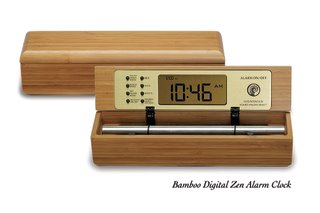 Yoga Timer with Chime
Yoga International senior editor Sandra Anderson is co-author of Yoga: Mastering the Basics and has taught yoga and meditation for over 25 years.
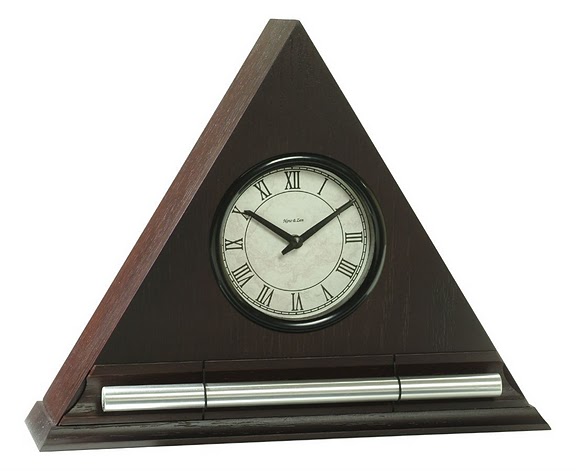 Gentle Alarm Clocks and Yoga Timers Now & Zen’s Yoga Timer and Alarm Clock Shop
1638 Pearl St.
Boulder, CO 80302
(800) 779-6383
Posted in Chime Alarm Clocks
 Snow print by Suzuki Harunobu It’s snowing heavily, and everyone in the backyard is in a swimsuit, at some kind of party: Mom, Dad, the high school principal, there’s even an ex-girlfriend. And is that Elvis, over by the piñata?
Uh-oh.
Dreams are so rich and have such an authentic feeling that scientists have long assumed they must have a crucial psychological purpose. To Freud, when dreaming provided a playground for the unconscious mind; to Jung, it was a stage where the psyche’s archetypes acted out primal themes. Newer theories hold that dreams help the brain to consolidate emotional memories or to work though current problems, like divorce and work frustrations.
Yet what if when dreaming isn’t psychological at all?
In a paper published last month in the journal Nature Reviews Neuroscience, Dr. J. Allan Hobson, a psychiatrist and longtime sleep researcher at Harvard, argues that the main function of rapid-eye-movement sleep, or REM, when dreaming occurs, is physiological. The brain is warming its circuits, anticipating the sights and sounds and emotions of waking.
“It helps explain a lot of things, like why people forget so many dreams,” Dr. Hobson said in an interview. “It’s like jogging; the body doesn’t remember every step, but it knows it has exercised. It has been tuned up. It’s the same idea here: dreams are tuning the mind for conscious awareness.”
Drawing on work of his own and others, Dr. Hobson argues that when dreaming is a parallel state of consciousness that is continually running but normally suppressed during waking. The idea is a prominent example of how neuroscience is altering assumptions about everyday (or every-night) brain functions.
adapted from The New York Times, November 2009 by Benedict Carey
 Honey Japanese Maple Leaves Zen Alarm Clock, calming alarm clock useful for remembering one's dreams Now & Zen
1638 Pearl Street
Boulder, CO 80302
Posted in Chime Alarm Clocks, Japanese Inspired Zen Clocks, Natural Awakening, Now & Zen Alarm Clocks, Progressive Awakening, Sleep Habits, Ukiyo-e, Zen Clocks and Dream Recall
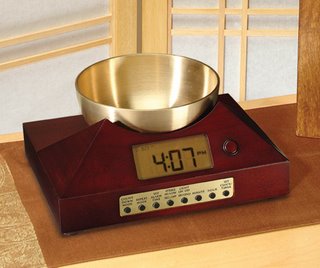 Zen Timepiece with brass bowl
Discover the healing power of sound with singing bowls, tuning forks, and other musical instruments.
Music can move us to tears, help us feel calm or comforted, or inspire us to action. The rhythmic sounds of nature (think of waves breaking on a beach) can bring us into balance. Now researchers are learning more about how music and sound directly affect the healing process.
EVIDENCE. A 2008 study at the University of Maryland School of Medicine revealed that listening to music you consider joyful for 30 minutes helps release endorphins to relieve pain and reduce stress, which can otherwise overload your immune system and lead to a host of health conditions. Another study completed last year at Seattle University in Washington showed that listening to Mozart for 12 minutes three times a week can lower systolic blood pressure by seven points.
YOUR BODY TUNES IN. Researchers say that when you listen to music and sounds, your heartbeat, breath, and brain waves begin to slow down or speed up in response to what you’re hearing. Your body syncs up with the sound, and the result can be an enhanced relaxation response—stress lifts, your heartbeat slows, muscles relax, and your body releases feel-good endorphins—or improved energy levels, depending on the rhythm.
GET STARTED. Try these ways to benefit from sound therapy:
EASE STRESS:
Use tuning forks and singing bowls
“Sonic tools” like tuning forks and singing bowls can soothe an overexcited nervous system, says Jonathan Goldman, author of The Seven Secrets of Sound Healing (Hay House, 2008). Singing bowls create a calming noise when you run a mallet around the rim, and tuning forks hum when tapped.
Try it: Use these tools as frequently as needed, says Goldman. For tuning forks, go to Healing Sounds or Biosonics. For crystal singing bowls, visit Crystal Tones. For Tibetan singing bowls, try Now & Zen, Inc., Headquarter Store, 1638 Pearl Street, Boulder, CO 80302.
RELIEVE INSOMNIA:
Listen to a healing CD
“Music is to the nervous system what nutrients are to the body,” says Joshua Leeds, author of The Power of Sound (Healing Arts Press, 2001). He designs audio CDs with music, special effects, and sounds from the natural world to enhance various activities, such as falling asleep.
Try it: See Sound Remedies or Steven Halpern Inner Peace Music.
SHARPEN YOUR MIND:
Learn an instrument
Studies show that daily practice of a musical instrument can keep the brain young and pliable. It can also help relieve tension as your body actually resonates with the soft energies of the instrument.
Try it: Find a local teacher and ask about beginner lessons. Practicing for five minutes can clear tension and a foggy mind. Use your Zen Timepiece in the morning to wake up to a singing bowl for a gentle and progressive awakening.
Our Zen Timepiece’s acoustic 6-inch brass bowl-gong clock is the world’s ultimate alarm clock, practice timer, and “mindfulness bell.”
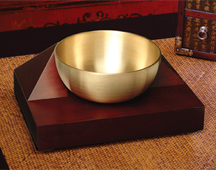 Natural Sound Alarm Clocks & Sound Therapy It fills your environment with beautifully complex tones whenever it strikes. In the morning, its exquisite sounds summon your consciousness into awakening with a series of subtle gongs that provide an elegant beginning to your day. Once you experience the Zen Timepiece’s progressive awakening, you’ll never want to wake up any other way. It also serves as the perfect meditation timer.
adapted from Natural Health Magazine July 2010, by Elizabeth Casey
 Singing Bowl Clocks by Now & Zen called The Zen Timepiece
Posted in Bamboo Chime Clocks, Chime Alarm Clocks, Goodness, Meditation Timers, Meditation Tools, mindfulness practice, Natural Awakening, Progressive Awakening, Well-being, Zen Timepiece by Now & Zen, Zen Timers
« Previous Page — « Previous Entries
Next Entries » — Next Page »
|
|
|
|